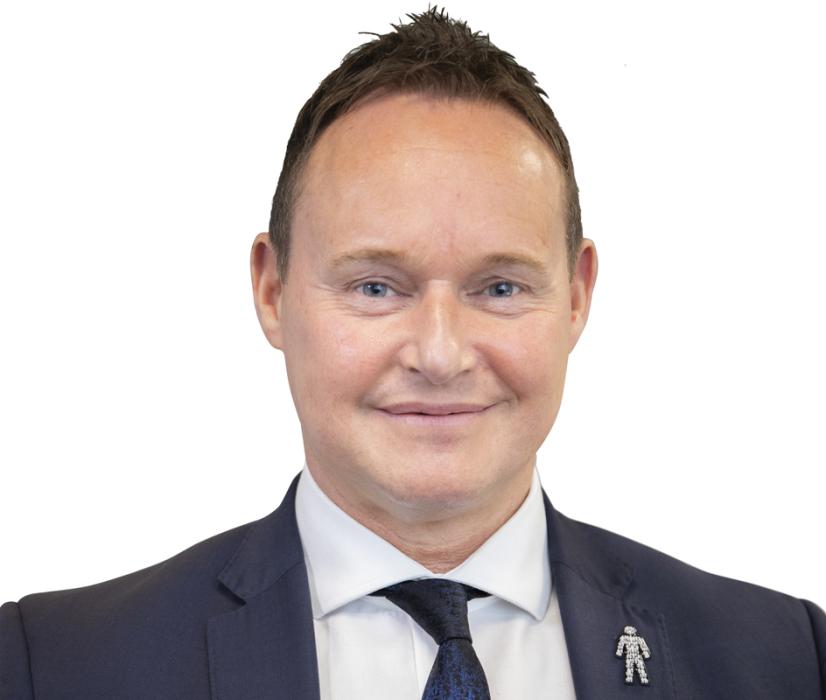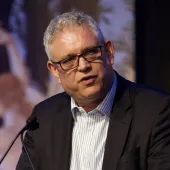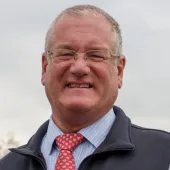New Institute of Quarrying President's Global Vision

First published in the October 2020 issue of Quarry Management as Rising to the Challenge
In September 2020 Martin Riley, senior vice-president of Tarmac, became President of the Institute of Quarrying (IQ), succeeding his predecessor Phil Redmond. In a recent Zoom interview with QM, he spoke about a global vision for IQ, the key priorities for the professional body and the challenges facing the minerals extractives sector in the post-pandemic world
In his first interview since becoming IQ President, Martin Riley wasted no time discussing his plans for his tenure of office, the huge challenges facing the aggregates industry and the need to push the Institute further into the limelight, as members move towards a post-pandemic future.
With more than 35 years’ experience in the quarrying and construction materials sectors, Mr Riley is widely recognized within the industry and brings significant extensive knowledge and operational leadership experience to the IQ Board of Trustees, having served as the Institute’s Chairman from 2018 until September this year.
Now, stepping up to his new role of IQ President (succeeding outgoing president Phil Redmond), the Institute’s 69th president is clearly looking forward to the challenges and opportunities that lie ahead for the organization.
‘I’ve been a proud member of IQ since the 1980s whilst completing the former Doncaster College-based DAPS (Doncaster Assisted Private Study) course and I have never looked back,’ Mr Riley explained during a recent Zoom interview from his home in the South West.
‘The value and benefits of being an active Institute member are huge. Quarrying is an industry that has always been, and continues to be, in demand. It is also a forever evolving sector, so it is vitally important that IQ continues to raise professional performance standards of the workforce and ensure construction/quarrying professionals have access to the best possible education and training opportunities in the UK and abroad.
‘Employees are undoubtedly a company’s most important asset. At Tarmac, we support and champion continuing professional development as a means of career progression for all the 7,500 highly motivated and ambitious operational employees that I oversee.’
He continued: ‘The construction products sector is a dynamic business environment which means you cannot sit back and rest on your laurels. Investment in CPD is an absolute necessity and we have a delivered a series of ongoing initiatives throughout the Tarmac organization to help employees add to their existing skill sets, further develop their expertise and, ultimately, fulfil their potential.’
Mr Riley certainly knows a thing or two about moving up the career ladder. The newly elected IQ President is extremely driven and has grabbed the opportunities that have come his way. He started work as an ‘roads apprentice’ in 1984 for Val de Travers Asphalte Ltd – an asphalt and contract surfacing business which a year later became part of Tilcon (who formerly operated under Tilling Construction Services Ltd), a successful and well-respected aggregates firm at the time.
‘The combined knowledge and expertise of the two businesses meant I was fortunate to be offered a higher apprenticeship in both road construction and quarrying disciplines,’ recalled Mr Riley.
‘Importantly, I’ve learnt and gained so much from taking the apprenticeship route, which provided a pathway for me to study up to degree level whilst I received on-the-job training and developed the technical skills and professional competence needed to excel within the industry.’
Since completing the industry-relevant qualifications, including the former DAPS course – which have now been replaced by the well-established University of Derby Diplomas in Quarry/Asphalt Technology – Mr Riley has worked his way through the ranks to the top of the profession.
He has held a variety of operational and leadership positions, from general manager and executive director to managing director and board-level roles. Being at the helm of Tarmac is without doubt the greatest honour of his professional life to date.
‘I’ve been involved in the aggregates industry all my working life and the career path I took was predetermined by my dad before I even got started,’ chuckled Mr Riley, whose father, grandfather and great-grandfather were also quarry workers.
‘Like many of my peers, the DAPS course really underpinned my career; it strengthened my practical knowledge of the industry, as well as the theoretical aspect. To anyone who is considering a career in quarrying or those who already work in the mineral products sector, I would strongly recommend completing the relevant qualifications and training apprenticeships.
‘However, any work-based learning programmes or accredited qualifications that you have completed must be kept up to date with current production processes, knowledge and operating practices. There have to be endless continuing professional development opportunities for people to progress and develop further in an ever-changing industry.
‘Whether it is delivering best practice, obtaining extractives technology know-how or improving health and safety performance, every day should be about learning new skills and gaining additional hands-on practical experiences.’
Mr Riley is keen to see IQ spread its influence and benefits far and wide. He fully supports the Institute delivering CPD programmes and forging strategic partnerships with employers, academic institutions, industry organizations and other professional bodies, to ensure members can access valuable industry information and the high-quality sector-specific education programmes, training and qualifications.
‘I clearly want to build on the success of what we have already achieved and continue to support the needs of IQ members and our industry partners, as we enter a post-pandemic economy that will prove tough for many across the construction supply chain,’ said Mr Riley.
‘This has been a challenging year. The coronavirus pandemic is impacting us all and will continue to do so, but I am immensely proud of the mineral products industry’s rapid response to the crisis and the implementation of meticulous safe working practices, from following the strictest hygiene and social distancing protocols, to delivering a safe environment for employees, customers, suppliers and contractors as site operations adapt to protect against COVID-19. I have also been impressed with how businesses and extractives/quarrying professionals have managed to stay agile, disciplined and diligent in these uncertain and testing times.’
A critical mission
Mr Riley recently welcomed the Construction Leadership Council’s (CLC) ‘Roadmap to Recovery’ plan – a two-year strategy to get the construction sector back on its feet following the COVID-19 pandemic.
The step-by-step guide has been published ahead of a critical period for UK construction and the wider economy, which will see the Government inject £5 billion into accelerating key infrastructure projects as part of Prime Minister Boris Johnson’s ‘New Deal’ to aid economic recovery and bring the country back to prosperity.
‘With major infrastructure and construction projects set to become a vital lever in driving economic growth – mineral products and construction materials will play a critical role in helping these schemes get off the ground, as well as delivering the vital renewal and upgrade works the country needs,’ commented Mr Riley.
‘In an environment where companies big and small have suffered massive disruption due to the coronavirus pandemic – collaboration, innovation and ambition have never been more important as we work together to harness the power of the wider quarrying industry and underline the essential role it plays in the construction supply chain.’
Whilst Boris Johnson’s ‘build, build, build’ pledge is welcome news for the heavy building materials industry – which will put jobs and infrastructure at the heart of the Government’s economic growth strategy – Mr Riley warned that the sector will need to overhaul the way it operates.
‘The Prime Minister’s New Deal is something that is warmly welcomed, but we must prioritize digital transformation, innovation and sustainable solutions as key drivers of success and in our delivery of supporting the UK’s infrastructure ambitions,’ he continued.
‘In addition, we need to champion career development and opportunities in the construction sector to ensure that the next generation of leaders have the skills, expertise and understanding to take the industry forward. Without these individuals, an infrastructure revolution will not be possible.’
According to Mr Riley, one of the key motivational factors for taking on the role of IQ President was the opportunity to ‘make a real difference’ within the field of education, training and professional development.
‘The growth of IQ in the past few years has been impressive and shows how important the industry considers education, training and professional competence,’ he stressed. ‘So, it is a huge honour to be the new IQ President and I am more excited than ever to be playing my part in the Institute’s ongoing development and look forward to championing the needs of the sector at every opportunity.’
Building skills for the future
As a proud former industry apprentice himself, Mr Riley hopes to use his position as IQ President to better engage with younger members and attract potential ones by raising awareness about the rewards of working in the quarrying and mineral extractives sector and breaking through the misconceptions that such jobs are mainly for men.
Currently, women make up around 14% of the UK construction workforce. Though that number is expected to rise in the coming years, women interested in pursuing a career in construction still face significant challenges and obstacles.
Whilst women are far more welcomed within male-dominated industries than ever before and cases of overt sexism seem to be few and far between, Mr Riley believes there is still a lot of work to be done in developing a workplace culture in the sector that values and promotes diversity, equality and inclusion.
‘With an alarming skills shortage being experienced across the wider construction industry, we need to build a diverse workforce where all people feel welcome – regardless of gender, age, ethnicity or creed,’ said Mr Riley.
‘It is also important to communicate how exciting, fruitful and inspiring the industry is, in order to attract new employees. With so many rewards and benefits of working in the sector – and plenty of room for career progression and skills development – we need to show the next-generation of talent that a career in construction is well paid, fulfilling and rewarding.’
Industry-supported graduate schemes, education programmes and higher apprenticeships have proven to be great ways of upskilling the construction materials sector. However, as the UK attempts to emerge from the post-pandemic economic downturn, many employers may be reluctant to invest in the professional development of their employees, especially as the furlough scheme winds down (officially ends on 31 October) which could see potential job cuts on the horizon.
Apprenticeship opportunities in manufacturing as a whole are already disappearing against a backdrop of COVID redundancies with fears of a lost generation, and Mr Riley was quick to point to out that both the mineral extractives sector and the Government must take urgent action to safeguard the skills the wider economy needs now and to allow employers to continue to deliver the high-quality training and apprenticeships for industry as the UK begins the hard work of economic recovery.
Despite the current climate, Mr Riley remains optimistic and feels the appetite for excellence and success still dominates UK manufacturing and construction. ‘As a CEO or director, you want the best people in your workforce because, at the end of the day, they are a reflection of you and your organization,’ he explained.
‘With a strong safety culture embedded in the quarrying industry, there is always room for growth and improvement of professional skills. Our partnership with the University of Derby’s Centre for Mineral Products has allowed us to deliver tailored learning for people interested in developing a career in our sector, as well as for those already working in mineral extraction.
‘CPD, upskilling and ongoing training helps employees to not only be competent in their profession, but also excel in it. It should be an ongoing process that continues throughout an individual’s career. Sustained investment in people also helps to make them stay interested and feel valued – which, fundamentally, ensures they do not slip through the net and into other industry professions.
‘This new-found enthusiasm can make an ongoing contribution to retaining experienced professionals and making our people engaged advocates for the wider construction sector. By providing opportunities for continuing professional development – companies are investing in their employees and, ultimately, strengthening the backbone of the business.’
In these challenging times, Mr Riley said IQ has to continue ‘making a noise’ about the key industry issues that interest people and its growing importance as a membership organization synonymous with high-quality education, training and professional development opportunities around the world.
‘Solving the UK construction skills shortages won’t happen overnight,’ he warned. ‘In this changing landscape, it’s crucial that we collaborate and join forces to bring new ideas, fresher perspectives and innovative processes to the table.
‘We need to look at the skills gap problem in different ways. Tackling the issue strategically and having the right initiatives in place will no doubt help cultivate and preserve the best talent pool and, by doing so, develop a fully trained and competent workforce fit for the future.’
Training day
One of Mr Riley’s proudest achievements as senior vice-president was seeing Tarmac’s National Skills and Safety Park, near Mansfield, in Nottinghamshire, receive the royal seal of approval in February this year (before the coronavirus lockdown) when it was officially opened by His Royal Highness The Duke of Cambridge.
Mr Riley led the Duke on a tour of the industry-leading centre, where His Royal Highness tried his hand at operating a paving machine, took time to chat with employees/apprentices and unveiled a new plaque marking the opening.
‘It was an incredibly proud moment for us all to be able to welcome Prince William to our National Skills and Safety Park, which is already playing an instrumental role in delivering first-class, practical training for apprentices, graduates and those retraining from other industry sectors,’ he commented.
‘We are the first construction materials firm in the UK to introduce such a facility and it forms part of our ongoing commitment to upskilling young people, with over 300 of our existing employees currently undertaking apprenticeships.’
Indeed, training centres such as the Tarmac National Skills and Safety Park will be part of the answer to bridging the skills gap in the wider construction industry. Creating an academy or education facility also reiterates the importance of raising staff competency levels and IQ has seen significant progress being made towards key areas of competence, including top-level leadership, workforce engagement and adopting a rigorous ‘zero harm’ approach to workplace safety, all of which are essential components of good health and safety management.
Mr Riley went on to explain that working in partnership is fundamental to reducing the number of accidents and incidents in the workplace, and the success of the quarrying industry is a prime example of what can be achieved through collaborative working.
‘Health and safety is, and will always be, the most important priority for the sector,’ he said. ‘We all have a common goal of making the workplace safer, improving standards and meeting the industry’s Zero Harm target, so it is imperative that best practices and innovative ideas are shared and spread across the supply chain.
‘The Strategic Forum for Health and Safety in the Mineral Products Sector – which brings together businesses, trades unions, professional bodies and regulators such as the HSE – is a clear example of partnership working, where many different stakeholders collaborate and find solutions to the industry’s health and safety challenges.
‘Working collaboratively has always been part of IQ’s culture, so we need to continue to take this unified approach – as the Strategic Forum has demonstrated – to improve safety standards further and prevent accidents and ill health across the industry.’
Digital evolution
Advances in digital technology have opened up many new avenues of learning and education. From classes and seminars that can be attended online, to augmented reality and simulations, the widespread adoption of new technologies has completely revolutionized the learning process for students. In order to be fit for the digital age, IQ is embarking on an ambitious programme of digital transformation and innovation.
‘Technology will continue to change the face of education,’ commented Mr Riley. ‘And the biggest challenge facing the Institute is harnessing the power of mobile devices, apps and online tools to increase engagement, encourage more collaboration, drive innovation and improve teaching and student learning.
‘It’s vitally important that our digital offerings provide a modern digital experience to our members. We also need to develop and align on a digital strategy throughout the organization to get the next generation excited about the wider quarrying sector. Our online tools and digital content need to be simple, accessible, engaging and user-friendly, so that everyone wants to use them.’
A recent innovation in the Institute’s approach to supporting its members digitally has been the launch of the IQ Connect app. Available from both the Apple and Google Play stores, IQ Connect provides members with quick access to informative, industry-specific learning and best-practice guidance, as well as a digital platform for updating their CPD records and membership details.
During these uncertain times, it is hard to predict the exact impact the post-pandemic future will bring, and how companies will do business as Boris Johnson’s Conservative Party works on new trade agreements and deals following Brexit.
To put it simply, there will be plenty of challenges ahead for IQ, but members can expect a clear and consistent approach under the newly elected President, with a key focus on increasing the international scope of the Institute and the wider recognition of its global standards and qualifications.
The possibilities of transforming the digital landscape are huge and IQ’s technology-focused education strategy will continue to raise standards, share knowledge and help create a diverse and highly skilled workforce fit for the future of the minerals extractives industry.
Accepting the chain of office, Mr Riley is clearly excited by IQ’s transition into the digital era, the growth opportunities for the Institute and developing the industry skills needed to meet those changes now and further ahead.
He said: ‘Looking ahead, we must continue to attract, inspire and develop a diverse new generation of professionals that the industry needs now and in the future. Fundamentally, it will safeguard our future capabilities and provide certainty for the workforce of tomorrow, especially when infrastructure development and construction projects will play a vital role in the Government’s COVID-19 recovery strategy.
‘Going forward, we need to embrace globalization and digitalization, and with IQ Connect we have already made great strides in raising the profile of the Institute internationally whilst preparing ourselves for the future. Crucially, it has allowed us to extend our reach and ensure members and those operating within the industry are well supported and represented at all levels.’
For the new IQ President, there is no greater satisfaction than seeing young people ‘graduate’ from the IQ academy or complete an apprenticeship before going on to launch their own successful construction careers. And you just never know, one of them may turn out to be the next ‘Martin Riley’.
- Subscribe to Quarry Management, the monthly journal for the mineral products industry, to read articles before they appear on Agg-Net.com






